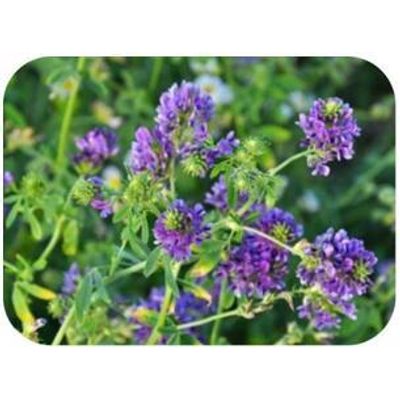

- Home
- Companies
- CDBioSciences - VLPlant
- Services
- Alfalfa-Based VLP Production Service

Alfalfa-Based VLP Production Service
CD BioSciences is a leading global company with advanced equipment and experienced staff dedicated to helping our global customers build virus-like particles (VLPs) from Medicago sativa (Alfalfa) plant to help you develop vaccines, nanomaterials and diagnostic reagents.
Overview of Alfalfa
Alfalfa, also called lucerne, commonly known as the "father of all foods" (al-fal-fa), is a perennial legume of Asian origin. Alfalfa is grown in many countries around the world as an important fodder crop for grazing, hay and silage, as well as a green manure and cover crop. Alfalfa also has medicinal value, is edible and contains a variety of active ingredients that can lower cholesterol and blood lipid levels, reduce atherosclerotic plaques, regulate immunity, antioxidant and anti-ageing functions. At the same time, alfalfa has ecological value and has a strong regenerative capacity, making it an excellent plant for soil and water conservation in mountainous areas.
CD BioSciences offers services covering all experiments related to the construction of VLPs through Alfalfa, including the construction of vectors containing the target gene, plant transient expression systems (Agrobacterium) and harvesting of Alfalfa plants containing VLPs, as well as VLP-Purification.
Workflow of Our Service
It all starts with screening for the target gene or viral code and then using our technology to synthesize genetic instructions that the plant can `read`. The synthesized target gene is inserted into a bacterium, which then carries the information into Alfalfa plant cell.
Transient expression mediated byAgrobacteriumallows for faster and more efficient production of VLPs by the plant. The plant expression vector is transformed into the rootingAgrobacteriumand theAgrobacteriumthen infiltrates into the Alfalfa plant. Alfalfa plants are placed in carefully controlled greenhouses to rapidly produce VLPs in large quantities.
Once the plants have finished growing, we harvest the plants and mix the leaves with a solution to extract VLPs. VLPs do not contain genetic material, so they are not infectious. Additionally, plants carry a very low risk of introducing foreign human pathogens.
Our purification services for VLPs constructed from plant platforms include PEG precipitation, ultracentrifugation techniques, and affinity chromatography, to name a few. See the VLP-Purification page for details.
